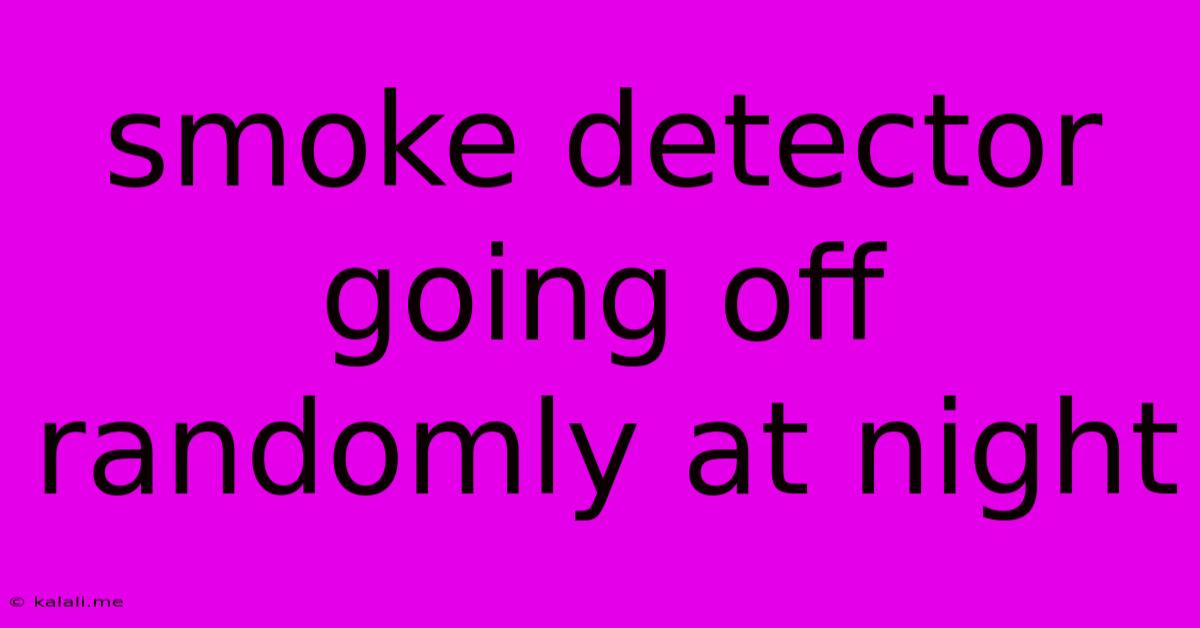Smoke Detector Going Off Randomly At Night
Kalali
May 31, 2025 · 4 min read

Table of Contents
Smoke Detector Going Off Randomly at Night: Troubleshooting and Solutions
Is that piercing alarm jolting you awake in the middle of the night? A smoke detector randomly going off is incredibly frustrating and disruptive. This article will explore common causes for this issue and provide actionable steps to troubleshoot and solve the problem, ensuring you get a peaceful night's sleep without the fear of a false alarm.
Understanding Your Smoke Detector
Before diving into troubleshooting, it's crucial to understand the type of smoke detector you have. There are two main types: ionization and photoelectric. Ionization detectors are generally more sensitive to fast-flaming fires, while photoelectric detectors are better at detecting smoldering fires. Knowing your detector type can help pinpoint potential causes.
Common Causes of Random Smoke Detector Alarms at Night
Several factors can trigger a smoke detector to go off at night, even without a fire. Here are some of the most prevalent:
1. Dust and Debris Accumulation
Dust, cobwebs, and other debris can accumulate inside your smoke detector, interfering with its sensors and causing false alarms. This is particularly common in older detectors or those located in dusty areas.
2. Insects and Pests
Insects like spiders or moths can build nests within the detector, triggering the alarm. This is more likely to occur if the detector is positioned near areas with high insect activity.
3. Humidity and Moisture
High humidity levels can affect the detector's sensitivity, leading to false alarms. This is especially relevant in bathrooms or kitchens where moisture is prevalent. Steam from a shower or cooking can temporarily trigger the alarm.
4. Low Battery
A low battery is a classic cause of erratic smoke detector behavior. A failing battery might send intermittent signals, resulting in random alarms, especially at night when things are quieter. Always replace batteries as recommended by the manufacturer.
5. Electrical Interference
Faulty wiring or interference from other electronic devices can sometimes cause the smoke detector to malfunction. This is less common but can be a factor to consider if other troubleshooting steps fail.
6. Overly Sensitive Detector
Some smoke detectors are simply more sensitive than others. This isn't necessarily a fault, but it can lead to more frequent false alarms, particularly in environments with volatile air particles.
7. Cooking Smoke or Steam
While generally not a problem at night, lingering cooking smells or excessive steam can sometimes be detected by a sensitive smoke alarm, even hours after the event.
Troubleshooting Steps: Getting to the Root of the Problem
Let's tackle those annoying nighttime alarms:
-
Check the Battery: This is the easiest and most frequent fix. Replace the battery even if it seems fine.
-
Clean the Detector: Carefully vacuum or use compressed air to remove dust and debris from the smoke detector's vents and internal components. Always turn off the power to the detector before cleaning.
-
Inspect for Insects: Carefully examine the detector for signs of insects or nests. If found, remove them and clean the detector thoroughly.
-
Check for Moisture: If the detector is located in a humid area, consider relocating it to a drier spot.
-
Test the Detector: After cleaning and replacing the battery, test the detector using the test button to ensure it's functioning correctly.
-
Consider the Environment: If the problem persists, assess the surrounding environment for potential sources of particles or volatile fumes.
-
Replace the Detector: If none of the above steps resolve the issue, it might be time to replace the smoke detector. Detectors have a limited lifespan and may become unreliable over time.
Preventing Future False Alarms
Regular maintenance is key to preventing random smoke detector alarms. Follow these preventative measures:
- Regular Testing: Test your smoke detectors monthly.
- Battery Replacement: Replace batteries at least once a year or as recommended by the manufacturer.
- Regular Cleaning: Clean your smoke detectors at least twice a year.
- Consider Interconnected Alarms: Interconnected alarms ensure that if one goes off, they all go off, potentially alerting you to a real fire more quickly, and allowing easier identification of the faulty alarm.
By following these steps, you can significantly reduce the chances of experiencing those disruptive nighttime smoke detector alarms and enjoy peaceful and worry-free sleep. Remember, a functioning smoke detector is crucial for safety, but a faulty one is a major inconvenience.
Latest Posts
Latest Posts
-
Do With That Information As You Will
Jun 02, 2025
-
Is There A Timer In Majoras Mask
Jun 02, 2025
-
How To Undo Dont Recommend Channel On Youtube
Jun 02, 2025
-
What Does The Clock Mean On Whatsapp
Jun 02, 2025
-
Should Iexpect Pubs In London To Accept American Express Cards
Jun 02, 2025
Related Post
Thank you for visiting our website which covers about Smoke Detector Going Off Randomly At Night . We hope the information provided has been useful to you. Feel free to contact us if you have any questions or need further assistance. See you next time and don't miss to bookmark.